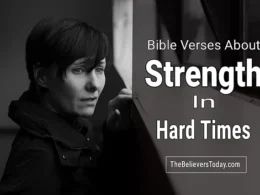Few things can paralyze humans like Fear. Fear prevents people from doing what they know they should do. Fear can also lead us to do things we know we should not do. Fear is more than just self-protection or self-preservation; terrified concern for the well-being and protection of those we care about can drive us to worry, stay awake at night, and even do actions that may be viewed as either very brave or very dumb. So, what overcomes fear? The Bible provides a clear and effective solution: confidence in God’s promises. “By faith he left Egypt, not being afraid of the anger of the king” (Heb. 11, verse 27).
This verse appears in the midst of Hebrews 11, as well as the author’s comments on Moses’ life. It briefly considers Moses’ faith in the face of a very real and present danger (in human terms): the ruler of Egypt. Moses was a guy like any other; blood flowed through his veins, just as it does in yours and mine. He was fully human, and so understood the reality of terror in the face of an impending peril. What the text says about Moses is noteworthy for various reasons. First, Moses is described as “not afraid of the king’s anger.” This strikes our attention because it contrasts sharply with an earlier time in Moses’ life when, after killing an Egyptian and burying him in the sand, he fled to Midian out of fear (Ex. 2:14, emphasis added). Moses had grown up as a son in Pharaoh’s household, yet he was clearly not above the law. When he resolved to intercede to save the life of the victimized Hebrew slave, he was consciously identifying with the sorrows of God’s oppressed people (Heb. 11:24). Moses’ passion, however, took him too far, and he killed a man. Moses ran to the wilderness, realizing not only what he had done but also the fact that it was known. Fear pushed Moses flee.
The next incident in Moses’ life to which the author of Hebrews draws our attention introduces us to a new Moses: a Moses who is no longer terrified of the king of Egypt—in fact, a Moses who is not afraid to return to Egypt, the place from which he fled. Moses was aware that, in human terms, he was entering the Lions’ Den. What made him willing to do so? Before we answer, we should note that the stress in Hebrews 11:27 is on Moses’ departure from Egypt, not his return to Egypt. Moses indeed return to Egypt, but the author is now referring to the point in the exodus when Moses begins to lead the Israelites out of Egypt. If anyone had a legitimate right to be afraid (in human terms), it was Moses. Egypt had been no friend to the Israelites, and the Egyptian king showed no affection for them or the God of Israel. Moses had every reason to believe that it wouldn’t be long before he had the wilderness in front of him and Pharaoh’s army behind him, with the people of Israel moving at a snail’s pace in between. So, why was Moses unafraid?
Few things may cripple us like fear; nevertheless, nothing can strengthen and empower us like confidence in God’s promises
It is here that we perceive what Moses saw: the invisible. By faith, Moses “endured as seeing him who is invisible.” This well-chosen wording is most likely a combined reflection on two topics. First, in Exodus 3, Moses witnessed the burning bush atop a mountain. From there, God spoke to Moses and commissioned him. Moses received his marching orders from a God whose voice Moses could hear but not fully see. Moses began to follow the God who was present, sovereign, and invisible—the God of Israel. The second element underlying this verse is what Moses witnessed throughout the plagues. It is remarkable that the author of Hebrews makes no mention of the plagues other than the climax plague, the Passover (Heb. 11:28). Thus, the author of Hebrews basically takes us from the time Moses chose to identify with the people of Israel to the time Moses led the people of Israel out of Egypt—and did so without fear of the king’s wrath.
Again, we ask, what altered Moses and made him fearless? Moses saw God. He did not see Him physically, but he witnessed Him fulfill His promises by the miracles (plagues) He performed. He witnessed a pompous and frightening Pharaoh quietly lower his knee before Him, the true King of kings and Lord of lords—the God of Israel. He witnessed Egypt’s magic and witchcraft fall like toy soldiers before Jehovah Raffa, “the Lord our banner.” He saw a group of individuals sitting in darkness experience a huge light—the light of the world. Moses may not have seen God personally, but he did see God in His work of rescue.
We’ve witnessed the same thing.
According to the author of Hebrews, we perceive God via Jesus Christ’s finished work, which fulfilled all of the lovely, saving labor that Moses’ ministry so vividly foreshadowed. The ministry Moses began has been perfected in Jesus Christ, who is superior to Moses in every aspect (Heb. 3). This is because Jesus was the God who talked to Moses in person. Jesus was and is both entirely God and totally human. During His trip on this earth, He was fully human, yet without sin. He understood what it meant to live under the danger of death, and He not only flawlessly and submissively obeyed His Father’s will, but He also did so with an eye on the recompense He was gaining for Himself and for us—heaven itself. Moses endured what he did to deliver the Israelites out of Egypt and into a country of rest, just as Jesus endured what He did to rescue us from our sins and bring us into the heavenly Zion that belongs to those who have saving trust in Him (Heb. 12). How does the story of Moses’ loyal persistence help us, people who frequently deal with fear and often live as slaves to it? It is in seeing what Moses saw: our God, who is present, sovereign, and invisible. And we see Him through the accomplished work of Jesus Christ. In Scripture, we hear His voice speaking to us with a sure word of promise that is “living and active” (Heb. 4:12). We do not need to see God in order to have faith enough to conquer our worries, but we do need to hear His assuring voice, which reminds us, as the Heidelberg Catechism so warmly declares, that “we are not our own, but belong to him, body and soul.” It is true that few things may cripple us like fear; nevertheless, nothing can strengthen and empower us like confidence in God’s promises.








